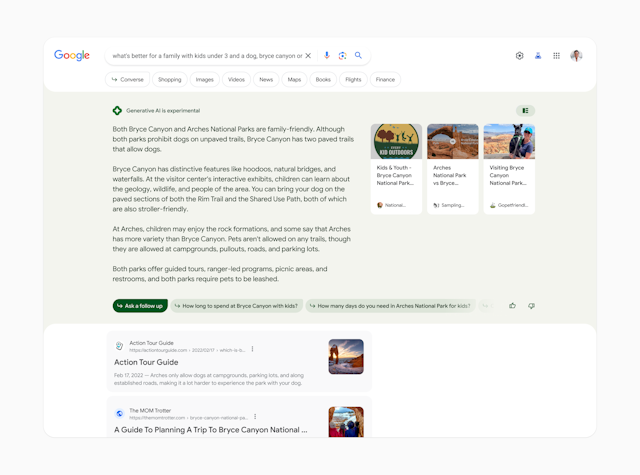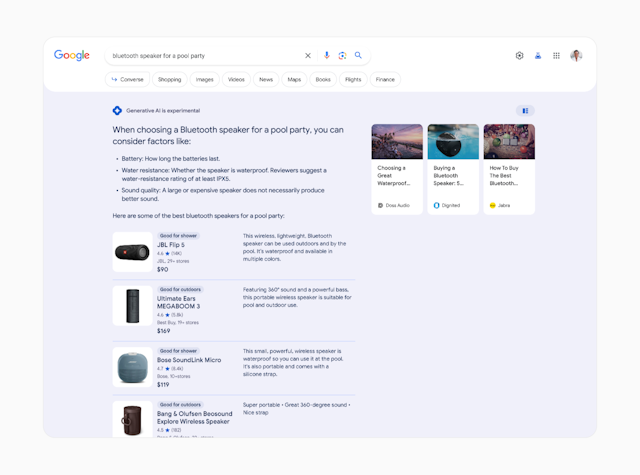Google unveils AI search integration, launches test-and-learn Search Labs initiative
The king of search is upping the ante in the increasingly competitive market for generative AI-driven search.

Google is integrating AI into its search experience / Solen Feyissa
Google is diving headfirst into the generative AI wars with new search capabilities.
The tech giant is launching Search Labs, an experimental program designed to develop new ways to optimize the search experience with generative AI. Cathy Edwards, the company’s vice president of engineering, took the stage at Google’s developer conference I/O in Mountain View, California today to announce the news.
“This new experience really reflects the beginning of a new chapter, and you can think of this evolution as, ‘search, supercharged,” Edwards said. “Search has been at the core of our timeless mission for 25 years and as we build for the future, we're so excited for you to turn to Google for things you never dreamed it could.”
The first experiment rolling out to users will be Search Generative Experience (SGE), an AI-integrated experience in which users can enter highly detailed queries – which may previously have required more than one search – and receive summarized results with interactive features inviting them to dig deeper.
SGE is slated to roll out in the coming weeks on Chrome desktop and the Google app on Android and iOS in the US market. Data gathered from the beta will be used to improve the experience moving forward.
The announcement comes just days after an internal company memo outlining major concerns about Google’s place in the AI marketplace leaked online. The memo, reportedly penned by senior software engineer Luke Sernau, betrayed deep concern that Google’s rivalry with Microsoft and ChatGPT parent company OpenAI may be distracting from a more imminent threat: open source AI. “While we’ve been squabbling, a third faction has been quietly eating our lunch,” Sernau wrote.
Now, Google is hoping to stem some of the momentum of its competitors with Search Labs.
Advertisement
Solutions to complicated queries
Google hopes that SGE will be especially useful for image-based queries and questions that may be difficult to express in a basic text prompt. “I have this [bird of paradise] flower in the back of my yard – I grew up on the East Coast; I never saw a flower like this where I grew up. What is this flower? I would have no idea how to express it. As you make it easier for people to ask questions [by integrating image-based search and AI], they come with those questions,” Liz Reid, vice-president and general manager at Google Search tells The Drum.
Another use case: multi-pronged queries that may previously have required multiple searches. Reid explains: “Sometimes people have a question, and they don't ask us the question – they take [it and] decompose it into, like, 15 questions, and they try and ask each part and they try and assemble it. How do we make those [kinds of experiences] easier?”

In an example shared by Edwards onstage today, a user searches, “what’s better for a family with kids under 3 and a dog, bryce canyon or arches.” Though this type of query might have historically be broken down into a handful of smaller ones, generative AI-powered SGE is able to process the different layers of the question and deliver useful responses.
Beneath a general summary of the findings, SGE will then surface other suggested questions, such as, “How long to spend at Bryce Canyon with kids?”, where users can explore a topic further.
SGE is also launching in Google Shopping. When a user searches for a product, they’ll be met with a summary of factors to consider when shopping and products that might be of interest. Products will also feature descriptions highlighting images, recent reviews and prices. The tool is integrated with the proprietary Google Shopping Graph, which encompasses over 35bn product listings online and sees 1.8bn listings refreshed each hour to ensure results are up to date.

Plus, in SGE's new Conversational Mode, a user can input follow-up questions and dive deeper into a given topic. In Conversational Mode, a user’s previous searches and the context of these queries will translate from one search to the next, helping the model deliver a more holistic, integrated experience.
Advertisement
Factuality over fluidity
As its name suggests, Search Labs is meant to be iterative as Google works to deliver highly accurate results to users. “We think Search Labs is a great way to launch things that are more exploratory and experimental in a way that allows us to talk with people about what they like, to gather their feedback and have them help shape the future of search,” says Reid.
And all Search Labs experiments, including SGE, will, at least for the time being, prioritize delivering factually-accurate responses over promising fluid, human-like conversation. Though users undoubtedly want both conversational interactions and accurate results from AI experiences, Google believes the latter is foundational to maintaining user trust and safety while the company fleshes out the user experience.
As Reid puts it: “We care a lot about fluidity and factuality. One of the things that we find is that the more the models feel really fluid, the more likely they are to have errors. But more users trust them because they sound like a human. And so we want to actually err on the side of factuality, and build up fluidity in the experience rather than starting with something that feels very natural, but isn’t as trustworthy and has the opposite experience.”
“[We are] really focusing on, ‘What are the information needs that people have at the core?” she continues. “As we try and build out that [answer], we put a very high value on information quality. This has always been true of Google. It is something that our users really trust in us. They depend on us to help them understand information. We want to maintain that trust and really continue to learn.”
In an effort to further preserve user trust and safety, Search Labs tools like SGE will be built with consideration for sensitive queries, such as those concerning financial and medical information. SGE’s model is also trained to not surface summaries for queries with potentially harmful intent related to violence or self-harm.
Suggested newsletters for you
The role of advertising in AI-powered search
With the launch of Search Labs, Google is also conscious of the demands of “the ecosystem” of the web at large, Reid says. The company aims to balance both publisher and user needs.
“We really care about the value exchange to publishers. We want to drive attention to the content sources that are helping make the open web,” Reid says. “But we also really hear from our users that they also want to… hear from other sources – not just from an AI model.” As such, Google sees SGE and its future AI search tools as “a jumping-off point” to help users explore more content online, rather than serving as the be-all and end-all of the search experience.
Part of Google’s aim to support the entire ecosystem of the open web of course involves advertisers.
As part of Search Labs, ads will appear in new contexts – like Conversational Mode – but in formats that users are familiar with, such as display ads and shopping ads. “Search is just supercharged with generative AI, and [Google] Ads just goes along for the ride,” says Vidhya Srinivasan, Google’s vice-president and general manager of advertising.
Google will maintain the same focus on relevancy for audiences, as well as transparency, says Srinivasan. Ads delivered in Search Labs products will be clearly labeled with Google’s ‘Sponsored’ badge so that users can tell which content is promotional versus organic.
The announcement comes just weeks after Microsoft debuted ads in its GPT-4-powered Bing Chat, which has garnered significant consumer attention – and also made headlines for its algorithm’s missteps.
Responsibility as a driving principle
Google has for years put AI at the very heart of its mission. In 2016, when Sundar Pichai took the reins as chief exec, he announced his intention to make Google an “AI-first” company.
Search Labs is simply the newest iteration of that vision.
Reid says: “With generative AI, we think about this as the next evolution of search... [we‘re] not building something different, but really making search much stronger and much more capable.”
A foundational focus for Search Labs and for all of Google’s AI initiatives will be social responsibility and the ethical deployment of technology. “We really want to innovate, but we always want to ground [our efforts] in our sense of responsibility to our users,” Reid says.
Pichai and Google leaders unveiled a handful of other AI-enabled products at I/O Wednesday, including new photo editing tools and features in Google Workplace and Google Maps. Pichai and other Google leaders also showcased updates to the infrastructure underpinning many of its new AI initiatives, including the company's newest and most sophisticated large language model PaLM 2.
Signups for Search Labs open today – users can express interest in trying out SGE by simply tapping the ‘Labs’ icon in Chrome on their desktop or within the Google app.
For more, sign up for The Drum’s daily US newsletter here.

